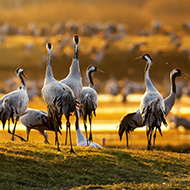Common crane returns to the UK

Cranes became extinct in the UK in the 1600s.
After a break of almost 400 years, the common crane is making a welcome return to the UK thanks to extensive conservation efforts.
Cranes became extinct in the UK in the 1600s owing to a combination of hunting and wetland decline. Now an estimated 200 birds are thought to be living across the UK, reaping the benefits of improved habitat management.
Adult cranes stand at 4ft and are fabled for their “complex” display dances of bows, pirouettes and bobs. They were even frequent fixtures at medieval feasts - Henry II’s chefs are said to have cooked up 115 of them at his Christmas feast in 1251.
In 1979, a small number of wild cranes returned to Norfolk and conservation groups have been working together to encourage more of these birds. The cranes have now spread to other areas of the UK, including the RSPB’s Lakenheath and Nene Washes reserves, as well as Natural England’s Humberhead Peatlands.
In 2010, the Great Crane Project was formed - a partnership between the RSPB, WWT and the Pensthorpe Conservation Trust. The project creates and improves existing habitat, as well as hand-rearing young birds for release on the Somerset Levels and Moors.
Damon Bridge, chair of the UK Crane Working Group explained: “The increase of cranes over the last few years shows just how resilient nature can be when given the chance. With the support of our wonderful partners, we’ve been able to recreate more and more of the cranes’ natural habitat, giving them a place to recuperate after the winter and raise their chicks. They are not yet out of the woods, but their continued population climb year after year is a very positive sign.”
Andrew Stanbury, RSPB conservation scientist added: “Thanks to the dedication of individuals, the UK Crane Working Group and conservation organisations, we are delighted to see crane numbers continuing to recover. Nature reserves have played a vital role. At least 85 per cent of the breeding population are found on protected sites, with a third on RSPB reserves alone”.



 The British Equine Veterinary Association (BEVA) is to allow its registered veterinary nurse (RVN) members the right to vote.
The British Equine Veterinary Association (BEVA) is to allow its registered veterinary nurse (RVN) members the right to vote.